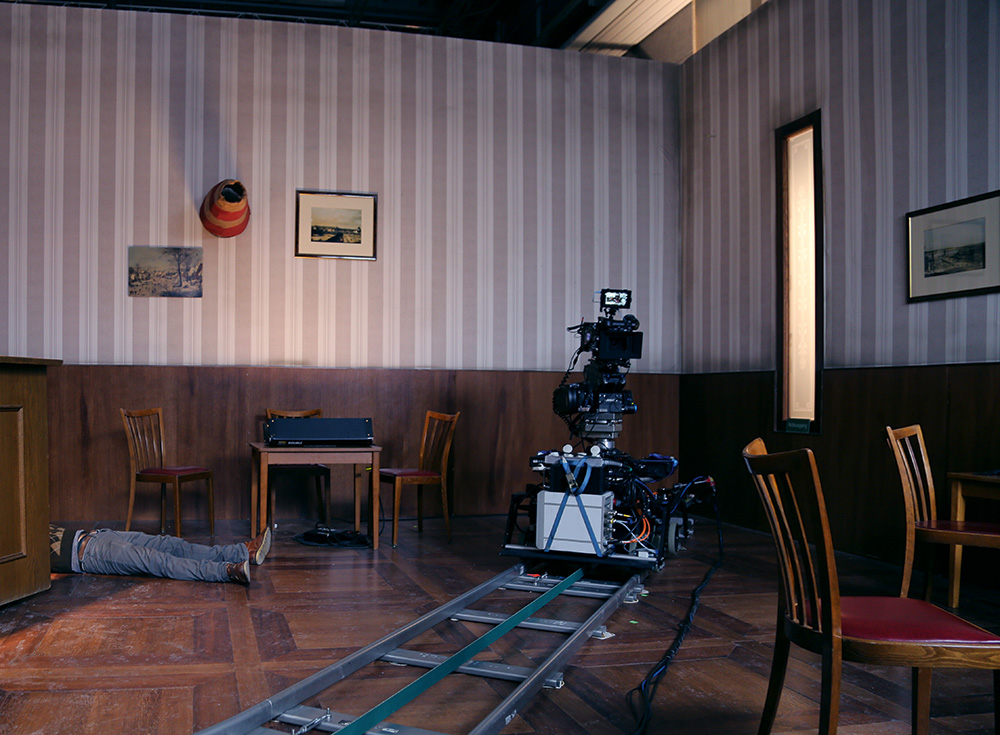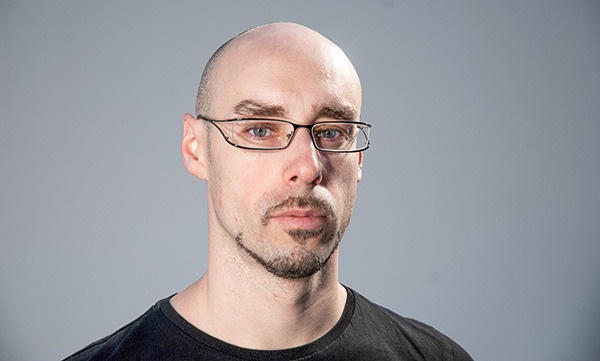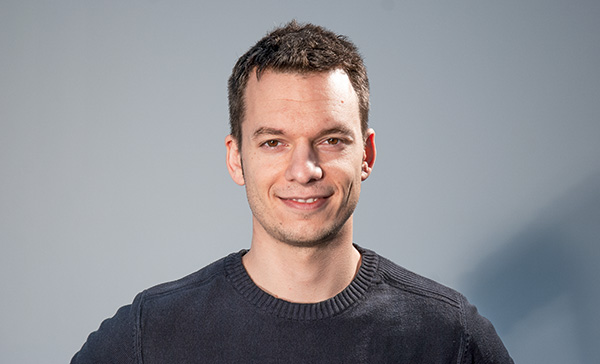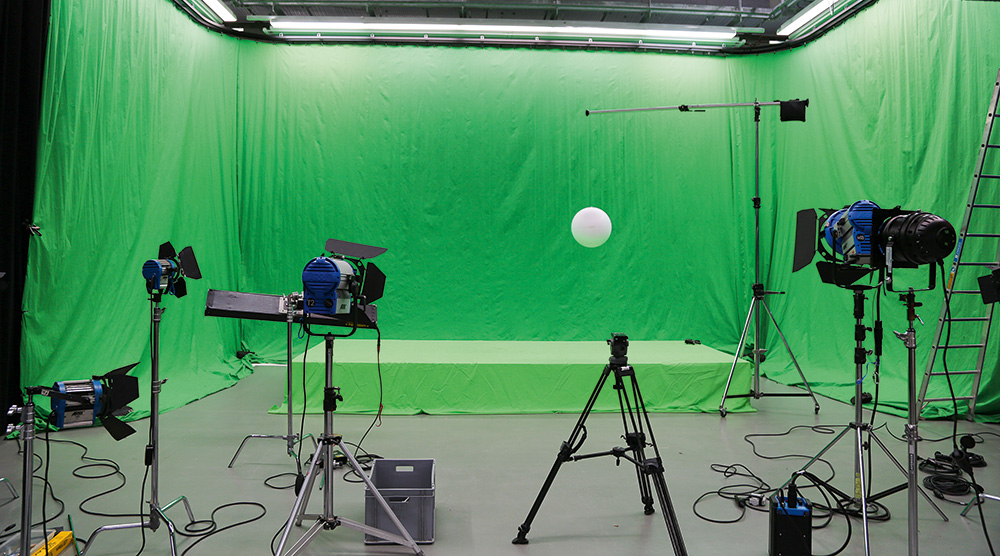Digital Art Compositing at Film Academy Vienna
Reading one’s own name in the credits of a major Hollywood production: it’s a dream that’s not at all that far off for those who study Digital Art – Compositing (DAC) at Film Academy Vienna. Martin Stegmayer and Valentin Struklec, who teach master’s degree students, provide insights into the everyday life of this mdw programme and explain just what a compositor actually does.

“When you have to get a house burning on set, you can’t set fire to a real one—you have to find other ways to make that house fire happen,” is how Valentin Struklec once explained his job to his grandmother. Burning down houses is, of course, just one of the many things that a compositing artist does: “Everything we can’t do on set during filming—because it’s too expensive, too dangerous, or maybe just plain physically impossible—we do on the computer,” says Martin Stegmayer, who’s led the compositing master’s degree programme at Film Academy Vienna since October 2012. Financial aspects of a film’s production are often the main reason why a compositor is used—after all, inserting a cityscape in postproduction is often less expensive than actually travelling to that city with an entire film crew. “But then there are also the creative aspects, which are of course what we find more interesting. Like when it’s about creating special atmospheres or visuals,” says Struklec. Completing historic buildings that haven’t been preserved in their entirety, creating whole worlds that show a future that doesn’t yet exist in the required form, or making someone age by 20 years… compositing can achieve all this and much, much more.

The students in the mdw’s compositing master’s programme, which is unique in this form, come from all over—and they need not have done their bachelor’s degree at Film Academy Vienna. It’s much more important to bring along passion, creativity, and a certain talent, as well as an eye for pictorial composition. Martin Stegmayer is convinced: “As far as we’re concerned, the computer as such is simply a tool—a tool that can be learned. What it really always depends on is the other kinds of experience that applicants bring with them.” Having a technical understanding of the programs is helpful and makes it easier to get started. But an extremely positive effect in recent years has been had by the diversity of the occupational fields from which the students come: “It’s the wildest combination you can imagine. Which is great, because the team-building that goes on benefits everyone. The students learn a lot from each other because each of them comes from a different area,” says Struklec. Stegmayer adds: “We had one person, for example, who’d studied journalism before and had already done a lot of editing. His work stood out in the entrance exams, and nowadays, he’s working abroad as a very successful compositor.” This openness towards applicants has paid off: of the altogether 19 students currently enrolled in this programme, most are already quite successful professionally. “Which is unfortunate!” says Stegmayer with a laugh. “Even after just two, three semesters, our students already find themselves quite busy with paid work.” The two are proud, of course, that their students attain a level that’s in international demand so quickly.
But even so, they do want everyone to return—to finish their studies, but also to bring their know-how back to Austria: “The experiences they can contribute are of benefit to everyone. And they’re also able to use what they’ve learned towards their master’s degree projects—a film of their own, for example. Which is often the last project they’ll get to do where they enjoy complete creative freedom,” explains Stegmayer.

The two are also supported in their work by a great team of external instructors. Struklec: “We’re in a luxurious situation here, because we actually can sometimes give our students private instruction, which helps us to address their specific talents and needs.” From the very beginning, the students work together closely with the other specialisations at Film Academy Vienna. “Here, they have opportunities to work on projects that are all on a very high level,” says Stegmayer. “I think this is also what sets us apart from other such departments: the fact that we offer teamwork together with the areas of production, cinematography, directing, editing, and so on. It’s fairly rare to be able to benefit from such close networking with the various departments, working on projects together with their students,” adds his colleague.
At the Film Academy, as in the real business, it’s important for the compositor to be involved in a project from the very beginning: “Word has gradually gotten around that when you do a project from scratch and know you’ll need digital work in postproduction, the thing to do is to bring in someone from compositing right away,” says Stegmayer. This enables discussion of everything that’s possible in terms of visuals in order to tell the story—which is the ultimate point, after all—in the best possible way. In the large Hollywood productions of the present, it’s sometimes as much as half of the budget that’s earmarked for visual effects. So compositing artists most certainly are in demand.
The very first visual effect was done in 1895—it was a stop trick used to accomplish the beheading in The Execution of Mary Stuart. Visual effects began appearing more broadly in connection with the ability to copy film—which is to say: with the advent of the optical printer. And this particular analogue film effect was used up into the early 1990s. The technical groundwork for digital film effects, however, had already been laid way back in the 1970s: it was a circle including computer scientist Edwin Catmull, the University of Utah, George Lucas, and Lucas’s production company Lucasfilm that first developed the technique of digital image compositing, which could be used to combine several images. Later on, in 1986, Catmull joined forces with Steve Jobs to found Pixar, where all this work came to fruition in that company’s initial animated film. In Austria, these technical innovations made their first appearances in the advertising industry. And even if a fair number of workarounds were necessary back then to compete on the global market, the present-day standard at Film Academy Vienna is without a doubt competitive internationally. “As long as you’ve mastered English plus the standard software, you really can begin work absolutely anywhere right from your first day on,” Struklec sums up.

“You shouldn’t be committed to living in any one particular place. If you want to gather a wide range of different experiences, it’s important to go abroad,” asserts Stegmayer. “And this industry is often very spontaneous. It might be that 20 people are needed in Singapore as well as 10 in Vancouver on short notice, and then they’ll all just get flown right in. So you really could call this profession a ‘free ticket around the world’. A good example here is Lukas Kampichler. Back when he applied, he said he wanted to do Star Wars someday—and he’s actually ended up doing just that,” remarks Struklec, who’s cheered by such success stories. But it’s not just about big names. “Ultimately, this is also a job that just has to get done—and you’ll occasionally find yourself sitting in a dark room at a computer for 40 hours a week or more working on two shots,” says Stegmayer. Struklec agrees: “It’s true that this is a meditative profession. But social skills are important, too. You have to know how to communicate and, above all, how to suss out just what it is that the others want so that you can realise it.” Stegmayer adds by way of conclusion that no matter whether you’re in Hollywood or in Vienna, “people don’t always agree on things—and it’s nice we’re able to simulate all that with a certain safety net at the Film Academy.”

